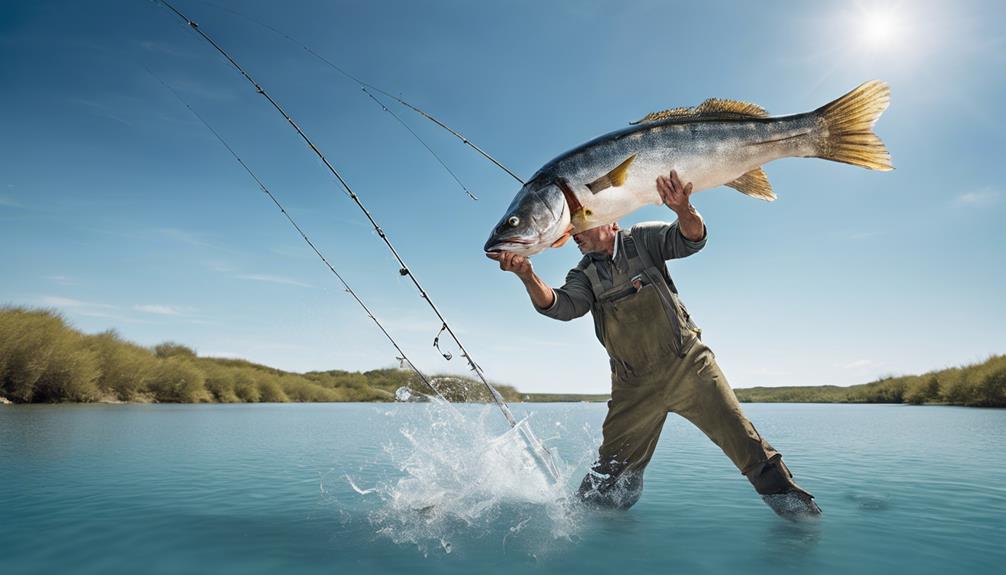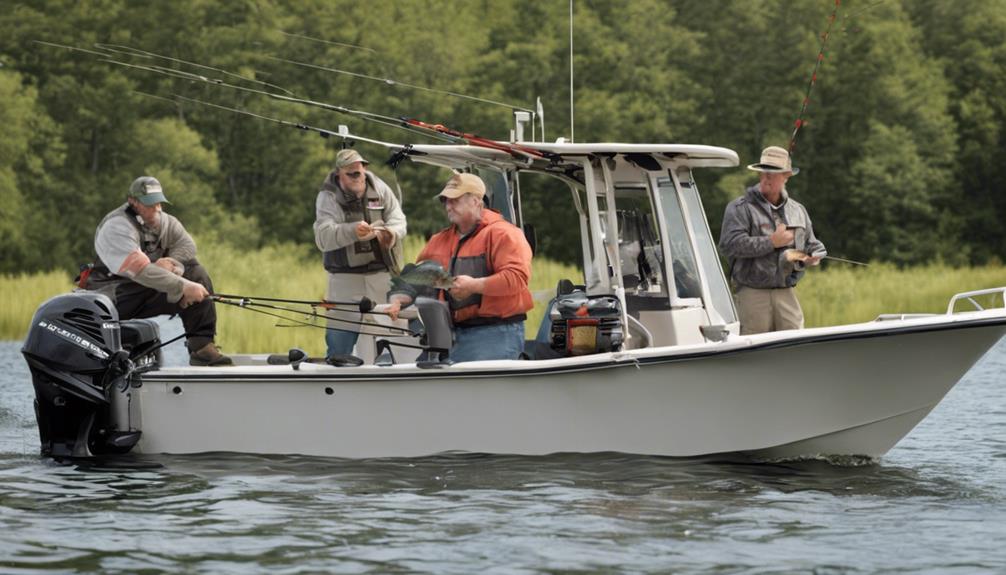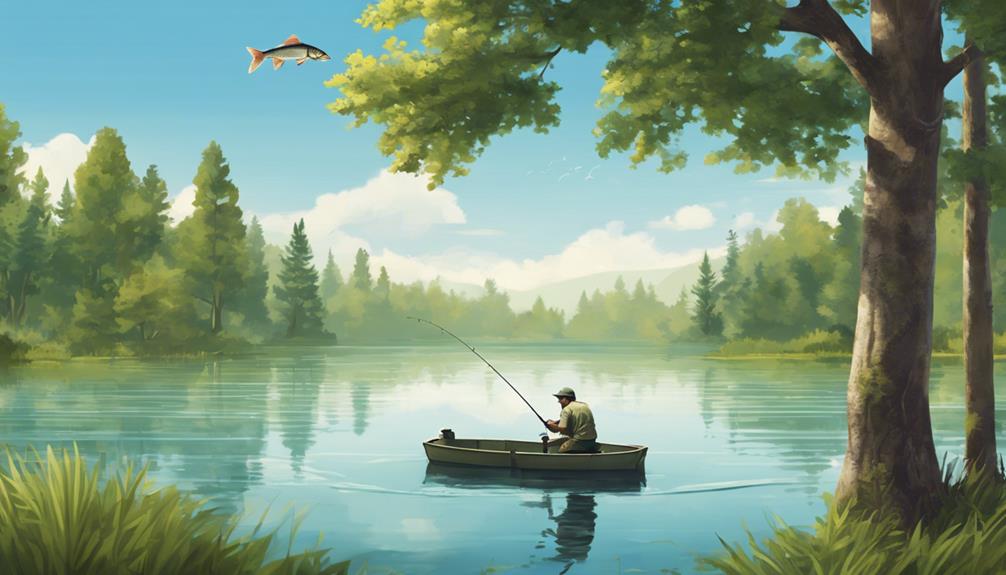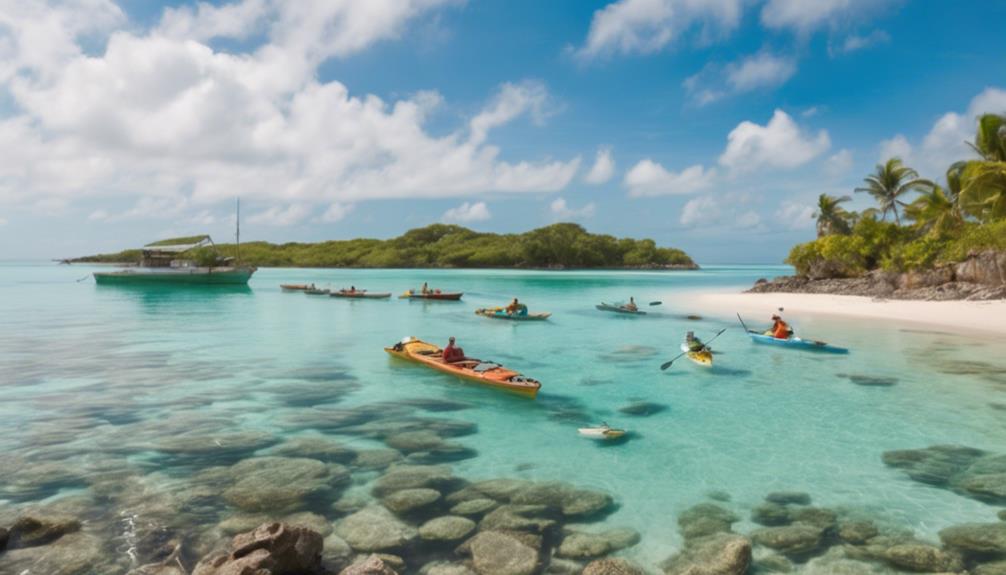Are you familiar with the saying, 'Give a man a fish, and you feed him for a day. Teach a man to fish, and you feed him for a lifetime'?
When it comes to sport fishing, adopting best practices for conservation is crucial not just for the fish but for the sustainability of the entire ecosystem.
By implementing these 8 key strategies, you can make a significant impact on preserving our marine environments and ensuring future generations can continue to enjoy the thrill of sport fishing.
Importance of Catch and Release
Catch and release practices are vital for the sustainability of sport fishing. By releasing fish back into the water after catching them, you're contributing to the conservation of fish populations. This practice helps maintain a healthy balance within the ecosystem, ensuring that the fish population remains stable and diverse.
When you practice catch and release, you're allowing fish to continue breeding and contributing to their species' population growth. This is crucial for preserving the natural balance within aquatic ecosystems. Overfishing can lead to a decline in fish populations, disrupting the delicate equilibrium of the underwater world. By releasing fish, you're playing an active role in maintaining the biodiversity and health of marine environments.
Furthermore, catch and release not only benefits fish populations but also has a positive impact on the overall ecosystem. Fish play a vital role in regulating aquatic environments by controlling prey populations and maintaining the health of underwater habitats. By releasing fish back into their natural habitat, you're helping preserve the intricate balance that supports a wide range of marine life.
Proper Handling of Fish
Properly handling fish is essential to ensure their survival after being caught. Fish health and stress levels can be significantly impacted by how they're handled when caught. When you reel in a fish, remember to handle it with care to increase its chances of surviving once released back into the water.
To minimize stress on the fish, avoid removing it from the water whenever possible. If you need to handle the fish, make sure your hands are wet to protect its slime layer, which is crucial for its health. Never squeeze the fish tightly or touch its gills, as this can harm the fish and interfere with its ability to breathe properly. Instead, use proper handling techniques such as supporting the fish under its belly and gently holding it to remove the hook.
Quickly removing the hook using proper techniques can also help reduce stress on the fish. If the fish is deeply hooked, consider cutting the line instead of causing further injury by trying to remove the hook. By being mindful of your handling techniques, you can contribute to the well-being of the fish population and promote sustainable sport fishing practices.
Selecting Sustainable Fishing Gear
When choosing fishing gear for sustainability, prioritize selecting equipment that minimizes harm to marine ecosystems. Opting for gear made from eco-friendly materials and designed for durability not only benefits the environment but also ensures a more responsible fishing experience for you.
- Choose gear made from eco-friendly materials: Look for fishing equipment made from sustainable materials such as bamboo, recycled plastics, or lead-free weights. These materials have less impact on the environment during production and disposal.
- Prioritize gear durability: Selecting high-quality gear that's built to last reduces the frequency at which you need to replace it. Durable gear not only saves you money in the long run but also decreases the amount of waste generated from discarded or broken equipment.
- Consider the lifecycle of the gear: Before making a purchase, think about how the gear was produced, how long it will last, and how it can be disposed of responsibly. Choosing gear with a minimal environmental footprint throughout its lifecycle is key to sustainability.
- Support companies with sustainable practices: Research fishing gear manufacturers that prioritize sustainability in their production processes. By supporting these companies, you're encouraging more eco-friendly practices within the fishing industry.
Support Marine Protected Areas
To promote marine conservation efforts, actively support the establishment and maintenance of Marine Protected Areas (MPAs). MPAs play a crucial role in safeguarding marine ecosystems, providing a safe haven for marine life to thrive. By engaging in community involvement, you can participate in beach clean-ups, educational workshops, and conservation projects within these protected areas. Your support can also extend to policy advocacy by voicing the importance of preserving these habitats to local authorities and decision-makers.
Education outreach is key to raising awareness about the significance of MPAs. You can educate others about the benefits of these protected areas through social media campaigns, school presentations, and community events. By sharing knowledge about the importance of marine conservation, you can inspire others to join in supporting MPAs.
Furthermore, research collaboration within MPAs allows scientists to study marine ecosystems, monitor species populations, and assess the effectiveness of conservation efforts. You can contribute to research projects by volunteering for data collection, participating in citizen science programs, or supporting scientific initiatives financially.
Engage in Habitat Restoration
Get involved in restoring habitats to support the conservation of marine ecosystems. Habitat preservation is crucial for the sustainability of marine life and the overall health of our oceans. By engaging in habitat restoration efforts, you can make a significant impact on the preservation of these valuable ecosystems. Community involvement plays a key role in successful habitat restoration projects, as it fosters a sense of collective responsibility and stewardship for the environment.
Key Points to Consider:
- Understand the Ecosystem: Before starting any restoration project, it's essential to have a thorough understanding of the ecosystem you're working to preserve. Conduct research and seek guidance from experts to ensure your efforts are targeted and effective.
- Identify Restoration Goals: Clearly define the goals of your habitat restoration project. Whether you aim to enhance biodiversity, improve water quality, or protect endangered species, setting specific objectives will guide your actions and measure the success of the project.
- Collaborate with Stakeholders: Engage with local communities, conservation organizations, and government agencies to gather support and resources for your restoration initiatives. Collaboration increases the impact of your efforts and promotes long-term sustainability.
- Monitor and Adapt: Regularly monitor the progress of your habitat restoration project and be prepared to adapt your strategies based on feedback and changing environmental conditions. Flexibility and continuous evaluation are key to successful habitat preservation.
Reduce Plastic Pollution
Engage actively in minimizing plastic pollution to safeguard the marine habitats and species you're working to preserve. Plastic pollution poses a significant threat to marine life, including fish populations that are crucial for sport fishing. To combat this issue, consider using eco-friendly alternatives to single-use plastics. Opt for reusable water bottles, containers, and bags when packing for your fishing trips. These simple swaps can significantly reduce the amount of plastic waste that ends up in the oceans.
In addition to using eco-friendly alternatives, implement waste reduction strategies to minimize plastic pollution further. Properly dispose of any plastic waste you generate while fishing and encourage others to do the same. Participate in beach clean-up efforts to remove plastic debris from shorelines before it can make its way into the sea. By taking these proactive steps, you can actively contribute to the conservation of marine habitats and the protection of fish species.
Promote Ethical Angling Practices
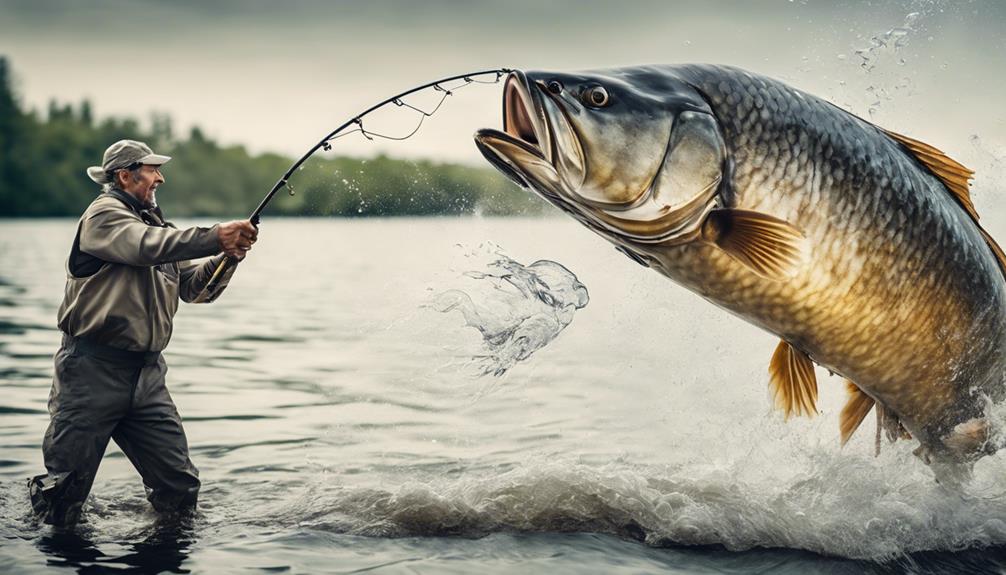
Promoting ethical angling practices is essential for ensuring the sustainability of fish populations and the long-term health of marine ecosystems. When engaging in sport fishing, it's crucial to prioritize fish welfare and act in a manner that respects the environment. By following responsible fishing practices, anglers can make a positive impact on conservation efforts.
Key Points to Consider:
- Catch and Release: Always handle fish with care and release them properly to minimize harm and stress on the fish population.
- Proper Gear Usage: Use appropriate gear such as circle hooks to reduce injury to fish and increase survival rates post-release.
- Respect Regulations: Adhere to fishing regulations and size limits to help maintain healthy fish stocks and prevent overfishing.
- Educate Others: Share knowledge about ethical angling practices with fellow anglers to promote a culture of conservation and sustainability.
Participate in Conservation Programs
Consider actively involving yourself in conservation programs to contribute to the preservation of marine ecosystems and fish populations. Community involvement in conservation initiatives is crucial for the sustainability of sport fishing. By participating in conservation programs, you can directly impact the health and abundance of fish populations in the waters you enjoy.
Education campaigns play a vital role in raising awareness about sustainable practices among sport fishers. These campaigns provide valuable information on catch-and-release techniques, size and bag limits, and ways to minimize environmental impact. By educating yourself and others through these initiatives, you can help ensure the long-term viability of fish populations for future generations.
Engaging in conservation programs also allows you to collaborate with like-minded individuals and organizations dedicated to protecting marine ecosystems. Through collective efforts, greater progress can be made in implementing effective conservation strategies and advocating for policies that support sustainable fishing practices.
Whether through volunteering, participating in clean-up events, or supporting conservation organizations financially, your involvement can make a significant difference. By actively contributing to conservation programs, you demonstrate a commitment to responsible angling and the preservation of our precious marine resources. Get involved today and be a steward of the oceans for generations to come.
Frequently Asked Questions
What Are Some Common Mistakes Anglers Make That Can Harm Fish Populations?
When fishing, be mindful of common mistakes that can harm fish populations. Exceeding catch limits and illegal fishing practices contribute to overfishing, depleting fish stocks.
Embracing catch and release practices helps conserve fish populations for future enjoyment. Remember, responsible angling ensures sustainability and the preservation of aquatic ecosystems.
How Can Anglers Ensure They Are Using Sustainable Fishing Gear?
To ensure you're using sustainable fishing gear, opt for eco-friendly gear and adopt sustainable practices. Look for gear made from recycled materials or designed to reduce harm to marine life. Choose equipment that minimizes bycatch and supports healthy fish populations.
What Role Do Marine Protected Areas Play in Sport Fishing Conservation?
Marine protected areas are crucial for sport fishing conservation. They provide safe havens for fish to breed and grow, ensuring sustainable populations for anglers to enjoy.
Education plays a key role in understanding why these areas are important. Community involvement is also vital in supporting and advocating for the protection of these marine habitats.
How Can Anglers Contribute to Habitat Restoration Efforts in Their Local Area?
To contribute to habitat restoration efforts in your local area, get involved in community projects that focus on restoring ecosystems. By volunteering and participating in restoration initiatives, you can make a positive impact on the environment.
Educate yourself on conservation practices specific to your area, and share this knowledge with other anglers to promote sustainable fishing practices. Your active involvement can help protect habitats and ensure a healthy environment for future generations.
Are There Any Specific Conservation Programs That Focus on Sport Fishing Conservation That Anglers Can Get Involved With?
There are specific conservation programs that focus on sport fishing conservation which you can get involved in. These programs offer community involvement, conservation education, volunteer opportunities, and policy advocacy.
Conclusion
In conclusion, by following these best practices for sport fishing conservation, you can make a positive impact on the environment and help protect marine ecosystems for future generations. Remember to always practice catch and release, handle fish properly, select sustainable gear, support marine protected areas, engage in habitat restoration, reduce plastic pollution, promote ethical angling practices, and participate in conservation programs.
Your actions can make a difference in preserving our oceans and marine life. Keep up the good work!
